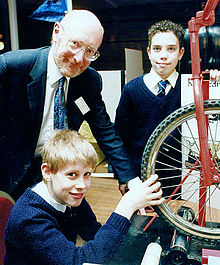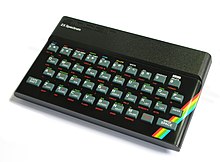Clive Sinclair
Sir Clive Marles Sinclair (born July 30, 1940 near Richmond ; died September 16, 2021 in London ) was a British inventor and entrepreneur . He became internationally known in the 1980s for the Sinclair ZX81 and ZX Spectrum home computers he developed . In Great Britain he had already made a name for himself with pocket calculators . He is also known there as the designer of the C5 electric vehicle .
Career
Sinclair, whose father and grandfather were already engineers, tinkered around at an early age and built radios or repaired amplifiers. When he developed a calculating machine powered by punched cards , he initially believed he was the inventor. Sinclair never went to college; shortly before graduating from high school in 1958, he developed a miniature radio that he wanted to sell by mail order. Initially, however, he worked as an author for the technical publishing house Bernard Babani and published a total of 13 books for hobby electronics between January 1959 and May 1962 . His Practical Stereo Handbook: The Complete Guide to Stereo (June 1959) had seven editions by 1973.
In 1961, Sinclair founded his first company, Sinclair Radionics , which initially produced hi-fi equipment (until 1974). Sinclair also worked as a writer between 1962 and 1969.
In 1972, Sinclair Radionics launched the Executive pocket calculator , which was significantly smaller than the competition because it was powered by hearing aid batteries due to its energy-saving technology. It was an early testimony to Sinclair's interest in miniaturization, which would show up again and again in later products. In 1974 the digital multimeter DM1 appeared ; Measuring instruments of this type formed a stable source of income for the company in the years that followed, funding more spectacular but commercially less successful projects such as the Black Watch presented in 1975 , one of the first digital watches. Like other Sinclair products, it was also available as a kit for a lower price. The futuristically designed watch had numerous technical defects and turned out to be a flop that almost meant the ruin of Sinclair Radionics. To save the company, the state National Enterprise Board (NEB) bought 43% of the shares in 1976. This allowed Sinclair to complete a project he had been working on for ten years - the Microvision TV1A pocket television, which launched in 1977.
The first computer that Sinclair constructed was the MK 14 (kit) in 1977 . This was followed by Grundy NewBrain , ZX80 and ZX81 . He developed the ZX Spectrum in 1982 after it was inferior to Acorn's much more expensive but more universal competing product , the BBC Micro , in the tender for BBC school television . However, the ZX Spectrum became the more commercially successful product. In 1984 the Sinclair QL followed , which however could not build on the success of its predecessor. In 1986, Sinclair sold his company to Amstrad . His last computer was the Cambridge Z88 , which he founded in the successor company Cambridge Computers Ltd. developed and manufactured from 1987. His developments in other areas include the C5 electric car , which, however, did not find enough buyers. The latest product from Sinclair Research is the A-Bike, a collapsible bike.
In 1983, Clive Sinclair of Queen Elizabeth II. In the knighthood raised. He was a member and chairman of the UK branch of Mensa for 17 years .
In 2021, Sinclair died at his home in London at the age of 81 after a long illness.
miscellaneous
The BBC released the TV film Micro Men in 2009 about the creation of the BBC Micro, which also covers the competition between the companies Acorn and Sinclair Research .
literature
- Ian Adamson, Richard Kennedy: Sinclair and the "Sunrise" Technology. London, 1986, ISBN 0-14-008774-5 .
- Rodney Dale: The Sinclair Story. London, 1985, ISBN 0-7156-1901-2 .
Web links
- Sinclair at bernd-leitenberger.de
- Entry about Sinclair in the 8Bit-Museum.de
- Sir Clive Sinclair on the website Planet Sinclair (English)
- Clive Sinclair in the Internet Movie Database (English)
Individual evidence
- ↑ Home computing pioneer Sir Clive Sinclair dies aged 81 , obituary by Haroon Siddique in The Guardian of September 16, 2021, accessed September 16, 2021.
- ↑ a-bike.co.uk: A-Bike Electric
- ↑ Wayback Machine. February 2, 2008, accessed September 26, 2020 .
- ↑ https://www.theguardian.com/technology/2021/sep/16/home-computing-pioneer-sir-clive-sinclair-dies-aged-81
| personal data | |
|---|---|
| SURNAME | Sinclair, Clive |
| ALTERNATIVE NAMES | Sinclair, Clive Marles (full name) |
| BRIEF DESCRIPTION | British inventor and entrepreneur |
| BIRTH DATE | July 30, 1940 |
| PLACE OF BIRTH | at Richmond |
| DATE OF DEATH | September 16, 2021 |
| PLACE OF DEATH | London |

